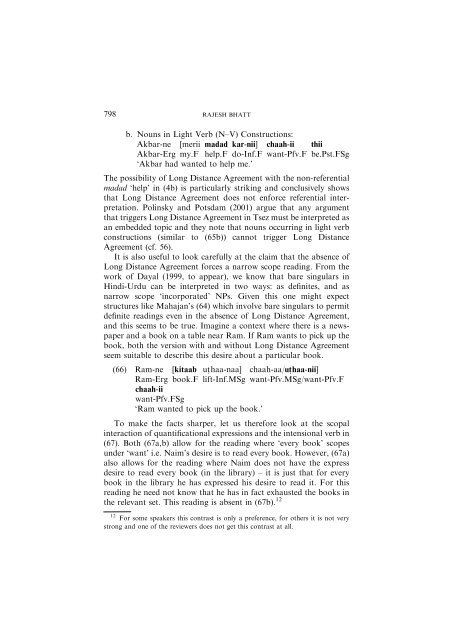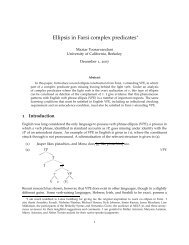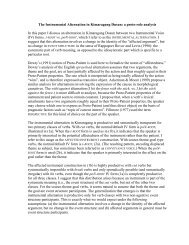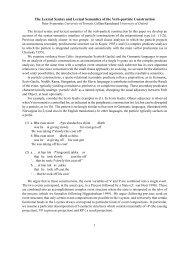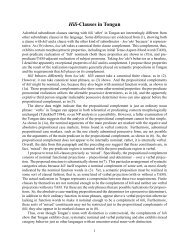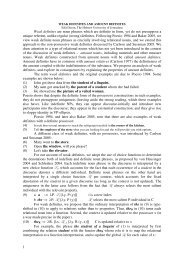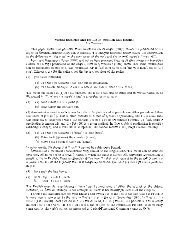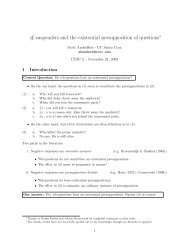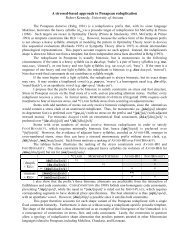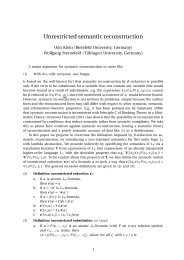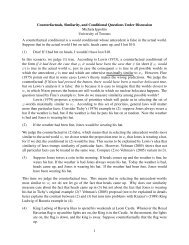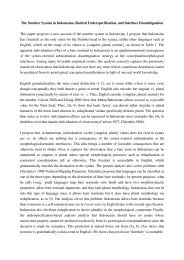LONG DISTANCE AGREEMENT IN HINDI-URDUw This paper ...
LONG DISTANCE AGREEMENT IN HINDI-URDUw This paper ...
LONG DISTANCE AGREEMENT IN HINDI-URDUw This paper ...
You also want an ePaper? Increase the reach of your titles
YUMPU automatically turns print PDFs into web optimized ePapers that Google loves.
798RAJESH BHATTb. Nouns in Light Verb (N–V) Constructions:Akbar-ne [merii madad kar-nii] chaah-ii thiiAkbar-Erg my.F help.F do-Inf.F want-Pfv.F be.Pst.FSg‘Akbar had wanted to help me.’The possibility of Long Distance Agreement with the non-referentialmadad ‘help’ in (4b) is particularly striking and conclusively showsthat Long Distance Agreement does not enforce referential interpretation.Polinsky and Potsdam (2001) argue that any argumentthat triggers Long Distance Agreement in Tsez must be interpreted asan embedded topic and they note that nouns occurring in light verbconstructions (similar to (65b)) cannot trigger Long DistanceAgreement (cf. 56).It is also useful to look carefully at the claim that the absence ofLong Distance Agreement forces a narrow scope reading. From thework of Dayal (1999, to appear), we know that bare singulars inHindi-Urdu can be interpreted in two ways: as definites, and asnarrow scope ‘incorporated’ NPs. Given this one might expectstructures like Mahajan’s (64) which involve bare singulars to permitdefinite readings even in the absence of Long Distance Agreement,and this seems to be true. Imagine a context where there is a news<strong>paper</strong>and a book on a table near Ram. If Ram wants to pick up thebook, both the version with and without Long Distance Agreementseem suitable to describe this desire about a particular book.(66) Ram-ne [kitaab ut:haa-naa] chaah-aa/ut:haa-nii]Ram-Erg book.F lift-Inf.MSg want-Pfv.MSg/want-Pfv.Fchaah-iiwant-Pfv.FSg‘Ram wanted to pick up the book.’To make the facts sharper, let us therefore look at the scopalinteraction of quantificational expressions and the intensional verb in(67). Both (67a,b) allow for the reading where ‘every book’ scopesunder ‘want’ i.e. Naim’s desire is to read every book. However, (67a)also allows for the reading where Naim does not have the expressdesire to read every book (in the library) – it is just that for everybook in the library he has expressed his desire to read it. For thisreading he need not know that he has in fact exhausted the books inthe relevant set. <strong>This</strong> reading is absent in (67b). 1212 For some speakers this contrast is only a preference, for others it is not verystrong and one of the reviewers does not get this contrast at all.


